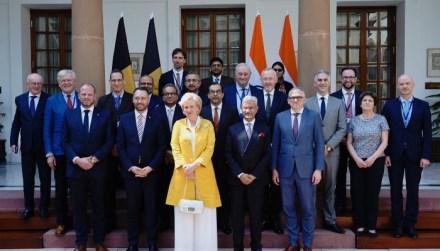India and Belgium have deepened their defence collaboration, as both nations work to expand their strategic and economic relationship. During the ongoing Belgian Economic Mission to India, (March 2-8, 2025) led by Princess Astrid, several key agreements were signed, including those in defence technology, military cooperation, and manufacturing partnerships.
The focus on the Zorawar light tank for the Indian Army and other critical defence projects marks a milestone in bilateral ties.
At a press meet in Delhi on Tuesday (March 4, 2025) Belgium’s Defence Minister, Theo Francken, made a major announcement regarding the appointment of a Defence Attache at the Belgian Embassy in New Delhi. This will be the first time the European nation will station a Defence Attache in India, a clear signal of its intent to deepen its military and strategic relationship with India.
Responding to a query, Minister Francken highlighted the importance of this development, explaining, that the region is very important, and China is becoming more aggressive. And it aligns with Belgium’s broader efforts to strengthen ties with India, as the country sees India as a critical partner in its strategic calculus, especially in the Indo-Pacific.
The Zorawar Indian Light Tank
One of the most important highlights of the defence cooperation is Belgium’s involvement in the Zorawar light tank, for the Indian Army. As has been reported previously by FinancialExpress.com, designed to operate in the challenging high-altitude terrains of the Himalayas, the Zorawar Indian light tank (ILT) is part of India’s strategy to modernize its forces and enhance capabilities in border regions.
Belgium’s contribution to this tank is substantial, with the John Cockerill company supplying the 105mm gun turret for the tank. The turret is a critical component that enhances the Zorawar’s combat efficiency. Speaking about this contribution, Minister Francken said, “Belgium’s John Cockerill is playing a key role in supplying the 105mm gun turret, an essential component for the Zorawar tank. This project highlights our growing partnership with India in the defence sector.” The tank is developed for the Indian Army by the Defence Research and Development Organisation (DRDO).
In addition to the Zorawar tank, discussions during the visit also centered on expanding Belgium’s role in India’s defence procurement. Indian officials expressed strong interest in Belgian expertise in various sectors, including aerospace, manufacturing, and defence technologies.
As part of the ongoing Belgian trade mission, several major contracts were announced, including a notable joint venture between John Cockerill and Electro Pneumatics & Hydraulics Pvt Ltd (EPHL), an Indian defence technology company.
This joint venture will focus on manufacturing turrets for India’s new light tanks, particularly the ILT (Indian Light Tank), which is designed for deployment in extreme terrains. The joint venture is a significant step in bolstering India’s domestic defence manufacturing capabilities and aligns with the government’s goal of reducing reliance on foreign imports.
Thierry Renaudin, CEO of John Cockerill, while responding to media question during an interaction remarked, “John Cockerill is committed to making India a manufacturing hub for the world. Our joint venture with EPHL underscores our dedication to supporting India’s defence modernization and self-reliance goals. This partnership will provide India with powerful, customized defence solutions tailored to its specific needs.”
The 60:40 joint venture is expected to bring advanced Belgian defence technology to India while helping to build local manufacturing capacity. Vivek Bhide, Regional President of John Cockerill, added, “The aim is to equip India’s armed forces with advanced solutions for diverse and challenging combat environments. We are excited to partner with EPHL to strengthen India’s position as a key player in the global defence industry.”
Agreements and MoUs
Alongside the joint venture, multiple agreements were signed between India and Belgian firms.
Belgian defence giant Thales Belgium signed a contract to supply 70mm rocket systems for the Indian Army’s helicopters. Additionally, OIP, a technology company from Oudenaarde, is in talks to provide advanced sensors for the new light tanks being developed for India’s armed forces.
Other defence companies including FN Herstal, Safran, Becover, Match ID, Amos, and Syensqo, have attracted interest from Indian Ministry of Defence and private sector companies.
On Monday (March 3, 2025) during the discussions, Defence Minister Rajnath Singh expressed India’s eagerness to integrate Belgian technologies into its military modernization efforts, welcoming Belgian investments in the Indian defence sector. Singh also underlined the importance of deepening defence industrial cooperation, urging Belgian companies to expand their footprint in India and work with Indian suppliers.
Both sides have discussed ways to enhance bilateral defence industrial cooperation and agreed to explore the establishment of an institutionalized defence cooperation mechanism. This mechanism will serve as a framework for long-term strategic collaboration. According to the visiting Defence Minister Francken the framework is expected to be ready before the year ends. “Defence Minister Singh has been invited and a Letter of Intent is there which is like pre-MoU related to the defence industry. “Also, there will be a port call soon by a frigate of our navy and Indian ships have been invited to for our Navy Day,” the minister added.
Strategic and Economic Implications of Growing Ties
The economic and strategic dimensions of the India-Belgium partnership are increasingly intertwined. As both countries strengthen their defence cooperation, they are also expanding collaboration in other areas, including clean energy, trade, and infrastructure.
Belgium’s Deputy Prime Minister and Foreign Minister, Maxime Prevot, emphasized the importance of this mission, saying, “Our mission to India presents an opportunity for Belgian companies to explore new markets, drive innovation, and create jobs back home, while contributing to India’s ambitious growth and modernization goals.”
